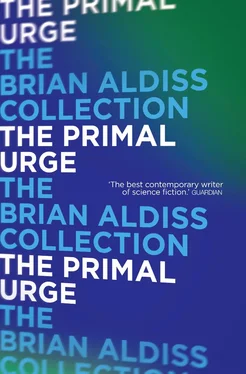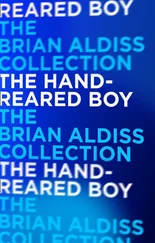Brian Aldiss - The Primal Urge
Здесь есть возможность читать онлайн «Brian Aldiss - The Primal Urge» — ознакомительный отрывок электронной книги совершенно бесплатно, а после прочтения отрывка купить полную версию. В некоторых случаях можно слушать аудио, скачать через торрент в формате fb2 и присутствует краткое содержание. Жанр: unrecognised, на английском языке. Описание произведения, (предисловие) а так же отзывы посетителей доступны на портале библиотеки ЛибКат.
- Название:The Primal Urge
- Автор:
- Жанр:
- Год:неизвестен
- ISBN:нет данных
- Рейтинг книги:5 / 5. Голосов: 1
-
Избранное:Добавить в избранное
- Отзывы:
-
Ваша оценка:
- 100
- 1
- 2
- 3
- 4
- 5
The Primal Urge: краткое содержание, описание и аннотация
Предлагаем к чтению аннотацию, описание, краткое содержание или предисловие (зависит от того, что написал сам автор книги «The Primal Urge»). Если вы не нашли необходимую информацию о книге — напишите в комментариях, мы постараемся отыскать её.
The Primal Urge — читать онлайн ознакомительный отрывок
Ниже представлен текст книги, разбитый по страницам. Система сохранения места последней прочитанной страницы, позволяет с удобством читать онлайн бесплатно книгу «The Primal Urge», без необходимости каждый раз заново искать на чём Вы остановились. Поставьте закладку, и сможете в любой момент перейти на страницу, на которой закончили чтение.
Интервал:
Закладка:
‘Where, Jimmy?’
‘Where what, pet?’
‘Where are we going to eat?’
‘Your uncle Jimmy knows a dirty little Chinese restaurant off Shaftesbury Avenue which stays open till two in the morning.’
She came and stood on his side of the partition then, to show him she was proud of him. When they were finally ready, they crept out of the hut, leaving the key on the outside of the lock, and walked quietly round the pool. Its surface was as still and black as oil. Keeping on the grass as far as possible, to avoid the scrunch of gravel, they skirted the house, where no lights burned.
A voice softly called ‘Goodnight!’ from above them. They looked up to see Jill Hurn leaning out of her bedroom window, shadowy under the eaves. She must have been there a long while, watching for them. Jimmy raised a hand in silent salute to all good things and led Rose back to the car.
They ate their chow mein, sweet and sour pork and crispy noodles in a quiet mood; when, after the meal, Rose insisted on catching a taxi and going off alone, Jimmy protested without vehemence and yielded without delay.
They were tired and had nothing more to offer each other.
It was a quarter to two when he let himself into 17 Charlton Square, and after three before he fell asleep. When he awoke next morning, it was to find his sheets full of earth, dead grass and dirt picked up from his session on the changing hut floor.
3
At the IBA
The Home of the International Book Association, where Jimmy worked, was a tall, undistinguished building just off Bedford Square. Unlike its rival and elder sister, the National Book League, the IBA claimed no Regency graces. There was American capital behind it: it was modern and proud of it.
As you went through plate glass doors into a foyer ambushed with cactus, a sign in sanserif announced, ‘Only books stand between us and the cave. Clyde H. Nitkin.’ The IBA ran mainly on dollar lubrication supplied by the Clyde H. Nitkin Foundation, and the words of the great man, at once original and obvious, were in evidence throughout the building. In the cafeteria downstairs, among the Mojave Desert décor, was ‘To read is to strike a blow for culture. Clyde H. Nitkin.’ In the Main Exhibition room on the ground floor was ‘Speech is silver: silence is golden: print is dynamite. Clyde H. Nitkin.’ Up in the library, appropriately enough, was ‘Only by libraries can man survive. Clyde H. Nitkin.’ And, most touching heart cry of all, reserved for the board room up by the roof, was ‘Dear God, I would rather be an author than Clyde H. Nitkin.’
This morning, Jimmy came in rather late. He stood for a moment in the rear of the foyer, exuding general goodwill. It was only six months since he had come to live in London and take this, his first job. Pleasure still filled him at the thought of it; he surveyed everything with a contentment at once filial and avuncular. Posters and book jackets jostled convivially here under busts of Shakespeare, Sophocles and Edna St Vincent Millay. Mr J. B. Priestley would speak on the 18th next on ‘What the Canadian Theatre Means.’ Angus Wilson’s new play Regular Churchgoers in its fifth week at the Criterion. Thyroid Annerson’s new play at the Stumer. The new Francis Bacon exhibition – the one with the laughing dogs – at the Hanover Galleries. Kingsley Amis to speak, mysteriously, about ‘The New Distaste’ on the 25th. The posters at least were quietly, staunchly English.
The book jackets struck a more exotic note. Peter Green’s name appeared on the serpent-haunted jacket of his large new novel Patinotoxa’s Donkey . Monkeys chased themselves round the latest Mittelholzer title from Secker’s. A formal jungle surrounded the word ‘Popocatepetl’ on Edmund Wilson’s new collection of travel essays. Orange prisms crashed across Berg and the Instability of Our Times . It was all, Jimmy told himself, at once homely and exciting. ‘The hoi polloi are rather coy at facing the printed word, but mad dogs and publishers care nought for the midday herd,’ he intoned to himself.
He nodded amiably to Mrs Charteris, the receptionist (somehow he could never think of anything to say to that woman) and went to his room. This room, lying beyond the Main Exhibition chamber, was isolated from everyone else in the building; nevertheless, it was nice to have a room at all, and Jimmy, who was second-in-command of exhibitions while Dirk Hanahan was away being ill in Boston, relished its privacy – especially this morning.
He was in a golden daze. He wanted only to sit quietly and think of the raptures of last night, with Rose alive in his arms. His room was almost bare; even the inevitable bookcase contained little more than Webster’s Dictionary and a pile of IBA pamphlets on people like Svevo. A Ben Nicholson relief on one wall only added to the austerity. That suited Jimmy well; the fewer external distractions the better.
The intercom on his desk buzzed.
‘And now a word from our sponsor,’ Jimmy groaned.
He depressed one of the ivory keys and said ‘Solent’ in a suitably crisp tone.
‘Scryban here, Jimmy. We’re having an informal discussion on next month’s activities, just pooling a few ideas. You’d better be in on it from the exhibition angle, I think. Would you kindly come up, please?’
‘Certainly.’ That was a blind. Jimmy felt perfectly fit, except for a dry mouth, but he just did not want to face people this morning. However, Scryban was Scryban and business was business … In Jimmy’s drawer lay a manila folder labelled ‘Haiti Exhibition’; he debated taking it up with him to Scryban’s room but, as that exhibition would not be held until September, decided it would look irrelevant or self-important or something equally horrid. Instead, he took the lift up to Scryban’s room.
‘Literature is a jealous god: serve it in deeds and words,’ adjured Clyde H. Nitkin from eye level.
Four people were already closeted with Scryban. Donald Hortense, the IBA librarian, a science-fiction magazine tucked in his pocket, winked at Jimmy. He was the only one here Jimmy could really say he knew. Mrs Wolf, a little, lipsticked woman with a big, difficult husband, smiled at him: Jimmy smiled back, for Mrs Wolf was always very sweet to him. Paul de Perkin, whose office door bore the enticing word ‘Social’, acted up to his label, indicating a chair for Jimmy and offering him a cigarette. The only person to ignore Jimmy’s entrance was standing looking out of the window; this was Martin ‘Bloody’ Trefisick, who called himself a Cornishman, though his detractors claimed he came from Devon. He was the declared enemy of Mrs Wolf, and his office door bore the oblique message ‘House Organ’.
Sitting sideways behind his desk, his neat knees crossed, was Conrad Scryban, the Managing Director of IBA. Jimmy had quietly admired this man from their first meeting; so effectively and unassumingly was he the English literary man, that Jimmy felt sure there must be fraud in the fellow somewhere. It made him roughly ten times as interesting as any of the other solid but transparent characters in the room.
Apart from Scryban and Trefisick, everyone in the room already bore a Norman Light on his forehead. It lent an air of strangeness and newness, like a paperback found among Roman relics.
‘Splendid,’ Scryban said vaguely, as Jimmy sat down between de Perkin and Mrs Wolf. Scryban’s baldness, like a tonsure, gave him a monastic look which his clothes quietly refuted. ‘We were saying before you joined us, Jimmy, that next month, being August, is rather a dog month generally. Anyone who is anyone will be no nearer Bedford Square than Tenerife. Nevertheless, we are duty bound to offer some sort of diversion to such of the general public as wander through our doors … Have you, I wonder, any suggestions? I hasten to add that none of the rest of us have.’
Читать дальшеИнтервал:
Закладка:
Похожие книги на «The Primal Urge»
Представляем Вашему вниманию похожие книги на «The Primal Urge» списком для выбора. Мы отобрали схожую по названию и смыслу литературу в надежде предоставить читателям больше вариантов отыскать новые, интересные, ещё непрочитанные произведения.
Обсуждение, отзывы о книге «The Primal Urge» и просто собственные мнения читателей. Оставьте ваши комментарии, напишите, что Вы думаете о произведении, его смысле или главных героях. Укажите что конкретно понравилось, а что нет, и почему Вы так считаете.












